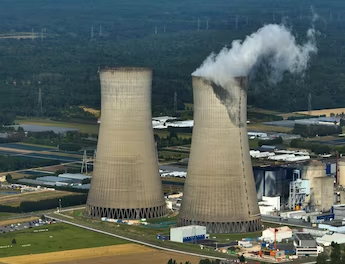Context:
Russia’s Rosatom State Atomic Energy Corporation extended an offer to the Atomic Energy Commission of India to expand nuclear cooperation.
Key Points:
- They have offered to build high-capacity nuclear power plants at a new site in India.
- This offer comes amidst growing energy demands in India and their push for cleaner energy sources.
The specific details of the reactor design haven’t been disclosed, but it might be related to:
- Proryv Project: Russia’s floating nuclear power plant project known as Akademik Lomonosov.
- Land-based Reactors: Russia has experience building land-based nuclear reactors, and the offer could involve these as well.
The Indian official visited the ‘Proryv’ or ‘Breakthrough’ project, which aims to develop a new power plant with a closed nuclear fuel cycle.
About Proryv Project (Akademik Lomonosov):
- The Proryv (Breakthrough) project is a significant initiative undertaken by Russia to advance nuclear technology. It focuses on developing innovative solutions for sustainable and efficient nuclear power generation, as well as tackling the issues of spent nuclear fuel and radioactive waste (RAW).
- The Akademik Lomonosov is a small, self-contained floating nuclear power plant. It is a part of the Proryv project.
- It can generate up to 70 MW of electricity, enough to power a city of about 100,000 people.
- The plant is equipped with two VVER-300 pressurized water reactors, a design Russia has experience with.
- The Akademik Lomonosov is the world’s first floating nuclear power plant and has been operational since 2020.
Floating Nuclear Power Plant (FNP):
- Floating Nuclear Power Plants (FNPs) are a type of nuclear power plant mounted on a floating platform, typically a ship or barge, allowing them to be deployed to coastal or isolated areas that lack sufficient infrastructure for land-based nuclear plants.
They offer several advantages:
- Ability to generate electricity in locations without access to traditional grids.
- Potential for lower construction costs compared to land-based plants.
However, FNPs also raise concerns about safety and environmental impact in case of accidents.
Present India-Russia Nuclear Cooperation:
- India and Russia have a long-standing and robust partnership in the field of nuclear energy. This cooperation is formalized through the “Strategic Vision for Strengthening Cooperation in Peaceful Uses of Atomic Energy,” signed in 2014.
A total of 6 Nuclear Power Plants of 1000 MW capacity are being constructed in Kudankulam, Tamil Nadu with Russian participation.
- Unit 1 is already producing electricity to its full capacity. Unit 2 is in the process of achieving criticality.
- Excavation work for construction of Units 3 and 4 are at an advanced stage. Both the sides are finalizing documentation for Units 5 and 6.
- The total installed capacity of the Nuclear Power Plants in Kudankulam in Tamil Nadu,would be 6000 MW.
Fuel Supply: Russia supplies enriched uranium fuel for India’s nuclear reactors.
- Nuclear Research and Development: Both countries collaborate on joint research projects in nuclear science and technology.
- Nuclear Safety and Security: They cooperate on sharing best practices and expertise in nuclear safety regulations and security measures.

